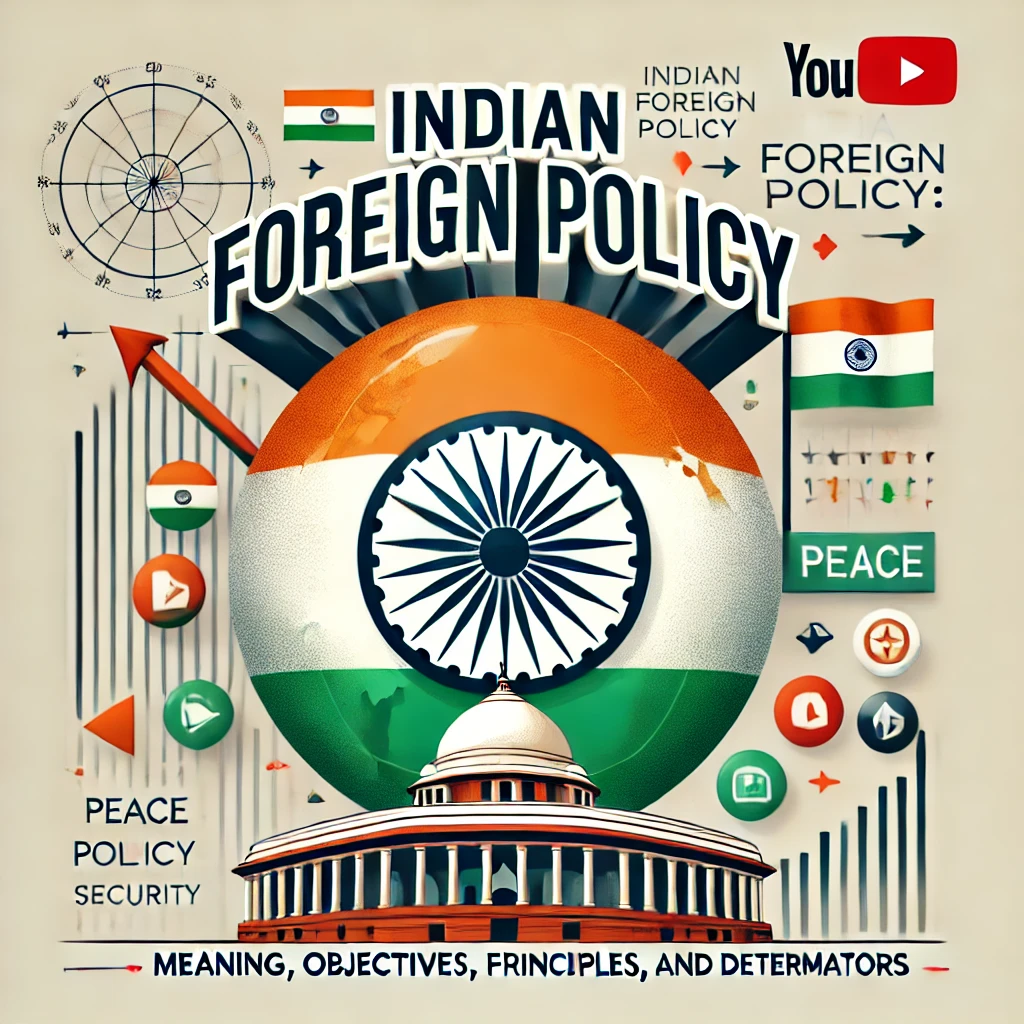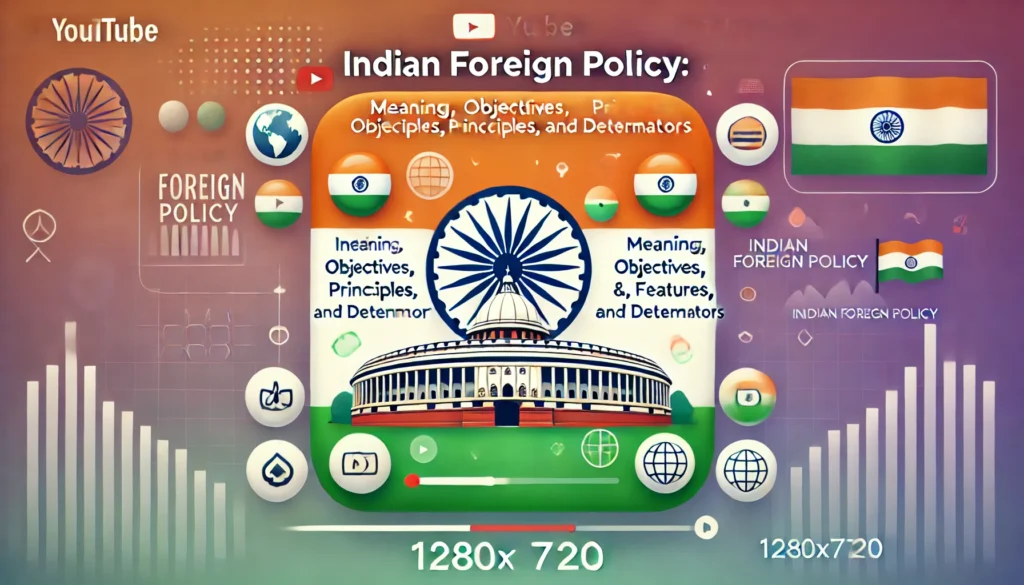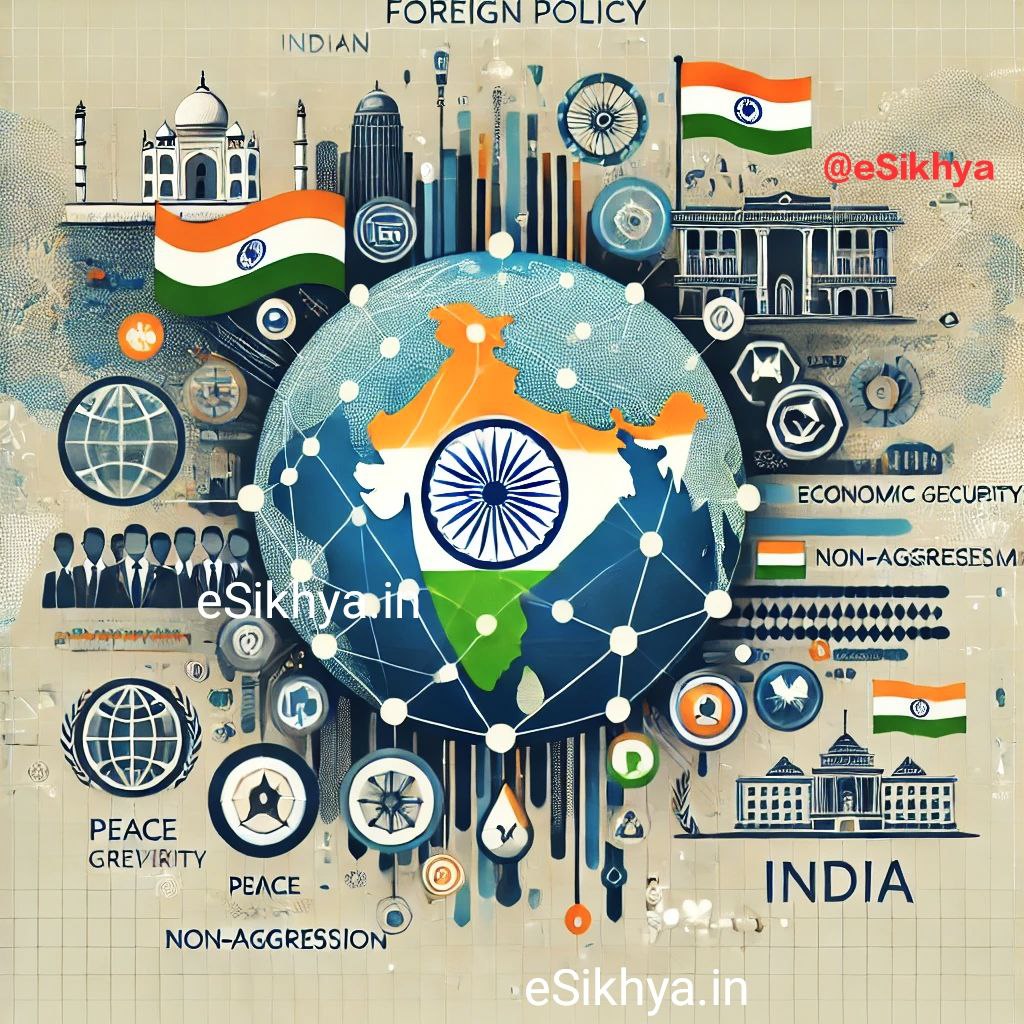Indian foreign policy is a strategic approach by the Indian government to safeguard and promote its national interests in the international sphere. It governs India’s interactions with other countries and international organizations, balancing national priorities with global commitments.
Meaning of Indian Foreign Policy
Indian foreign policy refers to the principles, strategies, and decisions that guide India’s relations with other nations and its participation in global affairs. It reflects India’s identity, historical experiences, and contemporary aspirations as a sovereign and democratic nation.
Objectives of Indian Foreign Policy
- National Security: Safeguarding India’s territorial integrity and sovereignty from external threats.
- Economic Development: Fostering international trade, investment, and technology transfer to promote economic growth and self-reliance.
- Global Peace and Stability: Advocating for peaceful coexistence and international dispute resolution through dialogue and diplomacy.
- Regional Leadership: Strengthening relations with neighboring countries and enhancing India’s influence in South Asia.
- Energy Security: Securing access to energy resources to meet the growing domestic demand.
- Multilateral Engagement: Active participation in international organizations like the UN, G20, and BRICS to shape global norms and policies.
- Cultural and Diaspora Diplomacy: Promoting India’s cultural heritage and ensuring the welfare of Indian communities abroad.

Indian Foreign Policy : principals
Indian foreign policy is guided by a set of principles rooted in the country’s history, culture, and values. These principles have evolved over time, reflecting changes in the global political environment and India’s own priorities. The key principles include:
1. Panchsheel – The Five Principles of Peaceful Coexistence
Formulated in 1954 during the Sino-Indian agreement on Tibet, these principles are central to India’s foreign policy:
- Mutual respect for each other’s territorial integrity and sovereignty.
- Mutual non-aggression.
- Mutual non-interference in each other’s internal affairs.
- Equality and mutual benefit.
- Peaceful coexistence.
2. Non-Alignment
- India was a founding member of the Non-Aligned Movement (NAM) during the Cold War era, maintaining strategic autonomy by not aligning with any major power blocs (the US or USSR).
- Today, this principle manifests as “multi-alignment,” balancing relations with various global powers while protecting India’s sovereignty and interests.
3. Strategic Autonomy
- India seeks to maintain independence in its foreign policy decisions, avoiding excessive reliance on any single nation while cultivating diverse partnerships.
4. Promotion of Global Peace
- Advocates for disarmament, multilateralism, and the peaceful resolution of conflicts, emphasizing the role of international law and organizations like the United Nations.
5. Vasudhaiva Kutumbakam (The World is One Family)
- Derived from Indian philosophy, this principle promotes global cooperation and inclusiveness, evident in India’s humanitarian aid, disaster relief, and leadership in climate action.
6. Development Diplomacy
- Focuses on South-South cooperation, aiding developing countries in areas like education, healthcare, and technology under initiatives like the Indian Technical and Economic Cooperation (ITEC) program.
7. Focus on Neighborhood First
- Prioritizes strengthening relations with neighboring countries in South Asia, promoting regional stability and economic integration.
8. Act East Policy
- An extension of the “Look East Policy,” focusing on enhancing ties with Southeast Asia and East Asia, especially in economic, strategic, and cultural domains.
9. Energy Security and Economic Diplomacy
- Seeks to secure energy supplies and foster international trade and investment, emphasizing partnerships with resource-rich nations.
10. Countering Terrorism
- Advocates for global cooperation against terrorism, emphasizing zero tolerance for terror activities and cross-border support for such acts.
11. Climate and Sustainable Development Leadership
- Demonstrates leadership in global climate discussions, particularly through initiatives like the International Solar Alliance (ISA) and advocating for renewable energy transitions.
12. Adherence to International Law
- Emphasizes compliance with international norms and agreements while supporting reforms in global institutions like the UN to make them more representative.
13. Gujral Doctrine ( G.D )
The “Gujral Doctrine” ( G.D ) in Indian foreign policy refers to a set of principles, primarily focused on fostering friendly relations with India’s immediate neighbors by adopting a non-reciprocal approach, meaning India would offer concessions and build trust with smaller countries like – Nepal, Bhutan, Bangladesh, Maldives, and Sri Lanka without expecting the same level of response in return, essentially prioritizing regional stability over immediate gains; it was proposed by former Indian Prime Minister Inder Kumar Gujral when he served as the External Affairs Minister.
Key points about the Gujral Doctrine ( G.D ):
- Non-reciprocity : India wouldn’t demand reciprocity from smaller neighbors countries, offering cooperation and accommodation even if it was not fully reciprocated.
- Respect for territorial integrity : All South Asian countries should respect each other’s territorial integrity and sovereignty in G.D.
- Peaceful resolution of disputes:Bilateral disputes should be resolved through peaceful negotiations.
- No interference in internal affairs:Countries should refrain from interfering in each other’s internal politics.
- Focus on dialogue:Maintaining open dialogue and communication with neighboring countries is key.
Significance of G.D :
- Regional stability:The Gujral Doctrine aimed to create a more stable and cooperative environment in South Asia by prioritizing India’s role as a responsible regional power.
- Improved relations with smaller neighbors:By offering unilateral concessions, India sought to build goodwill and trust with smaller countries.
Therefore; India’s foreign policy is dynamic, adapting to contemporary challenges while staying anchored in its historical principles and strategic objectives.
Features of Indian Foreign Policy
- Non-Alignment: Rooted in Nehru’s vision, India historically avoided aligning with major power blocs during the Cold War.
- Strategic Autonomy: Maintaining independence in decision-making while engaging with global powers.
- Panchsheel Principles: Emphasis on mutual respect for sovereignty, non-aggression, non-interference, equality, and peaceful coexistence.
- Focus on Multilateralism: Active involvement in global governance through institutions like the UN, WTO, and WHO.
- Economic Diplomacy: Leveraging trade agreements, investments, and technology partnerships to strengthen economic ties.
- Look East and Act East Policies: Enhancing ties with ASEAN and East Asian countries for trade, security, and cultural exchanges.
- Commitment to Global Challenges: Leading initiatives on climate change, counter-terrorism, and global health crises.

Determinants of Indian Foreign Policy
- Geography: India’s strategic location in South Asia influences its relations with neighbors, the Indian Ocean region, and beyond.
- Historical Legacy: Colonial experiences, the freedom struggle, and post-independence ideals shape India’s approach to global issues.
- Economic Interests: The need for trade, investment, and technology partnerships drives many foreign policy decisions.
- Defense and Security Needs: Cross-border terrorism, regional rivalries, and global security dynamics necessitate a robust defense strategy.
- Domestic Politics: Political ideologies, coalition pressures, and public opinion play a role in foreign policy formulation.
- Global Trends: Shifts in power dynamics, such as the rise of China or the role of the United States, influence India’s strategy.
- International Law and Norms: Adherence to treaties, agreements, and global standards underpins India’s diplomatic conduct.
Conclusion
Indian foreign policy is a dynamic and evolving framework that reflects the nation’s aspirations as a global player. Balancing traditional principles like non-alignment with contemporary realities such as strategic partnerships, India seeks to enhance its global stature while ensuring national interests. The policy’s focus on multilateralism, economic growth, and global peace positions India as a responsible and proactive member of the international community.

